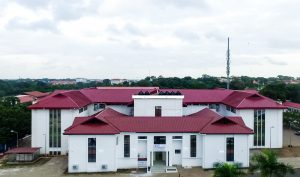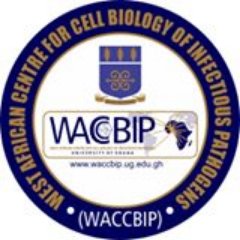Here’s where we shed spotlights on great places in Accra that add a spice of importance to our lives in various ways. Find out more about WACCBIP in this week’s spotlight on ‘Accra This Week’.
On the 11th of April 2020, news made waves of Ghanaian scientists making a breakthrough finding that will contribute immensely to the world’s fight against the novel coronavirus.
A press release from the public affairs directorate of the University of Ghana where the breakthrough was made indicated that these scientists in question found the genome sequence of strains of the virus from some five countries. This meant that they have been able to get the complete DNA sequence of the novel coronavirus. This helps other scientists around the world to know the virus’ genome at a single time.
Read Also: Bawumia proud of University of Ghana scientists for successful COVID-19 genome sequencing
This became a breakthrough as it gives scientists around the world a shortcut to easily find the genes of the virus and also get to understand how the genome as a whole works and how they work together to direct the growth, development and maintenance of the entire organism. This insight basically will help scientists find an appropriate vaccine for the disease without having to go through a hitherto long process.

Read: Bawumia Commends UG Scientists For Successful Sequence …
Whiles Ghana goes on the map by this, the question becomes “who was at the center of this?”. The answer is found in the University of Ghana. It was as a result of the joint effort of last week’s spotlight, the Noguchi Memorial Institute for Medical Research (NMIMR) and another such body; an African Center of Excellence called the West African Center for Cell Biology of Infectious Pathogens (WACCBIP), our focus for today.
Read: WEEK’S SPOTLIGHT; Noguchi Memorial Institute for Medical Research
About WACCBIP
Shortened as WACCBIP, the West African Center for Cell Biology of Infectious Pathogens was established in Ghana in the year 2013 on the campus of the University of Ghana affiliated to the school’s College of Applied Sciences and the Noguchi Memorial Institute for Medical Research. It came about as a result of a proposal the University made in response to the World Bank’s projects that sought to build African Centers of Excellence.
The bidding by University of Ghana met the required criteria that finally got them the nod to set-up the center with a world bank commitment of $8 million.
Read Also: UK commence first Human Trials for coronavirus vaccine
The Center initially operated from the Department of Biochemistry Cell and Molecular Biology (BCMB) till the year 2018 when it moved to their current location; a multi purpose office complex. The building is a equipped with a multi-purpose Conference Hall, a PhD lecture room, a Board Room, a state-of-the-art Cold Room, an office space for the Centre’s administrative staff, and workspaces for visiting faculty and WACCBIP fellows. There is also equipped with a High Performance Computing (HPC) unit, and a Confocal Microscope.
Achievements
In less than 10 years of its existence, WACCBIP has made some important strides the country and the world at large could be grateful for. In the year 2018, the center made a phenomenal breakthrough as a study they conducted revealed the presence of a strain of a virus in a fever called the Dengue Fever. This research became important because many clinics and hospitals that had treated cases of fever had missed it in their routine clinical diagnosis. This revelation thus became an eye-opener for health authorities to look out to avert the outbreak of such viral infection. The same virus was an outbreak in Burkina Faso some 4 years ago. In 2019, scientists from WACCBIP made a discovery of a gene that causes deafness in most Ghanaian Children called Gap junction beta 2 (GJB2) or Connexin 26
The center has also over the years been involved in outreach programs to senior high schools and other place in and out of the country; bootcamps, workshops, given internship opportunities and more in a bid to promote interest and education in the sciences.

Prof. Gordon Awandare is currently and the first director Director of the center. In 2015, he received the 2015 Royal Society Pfizer Early Career Award for his sterling achievement in the molecular and cellular studies of malaria, including how malaria parasites invade erythrocytes and cause diseases. He became the first Ghanaian to win this award.
















